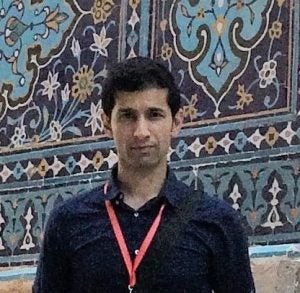
The Persianate Studies Workshop is pleased to welcome Dr. Waleed Ziad, who will be workshopping a paper titled “Bibi Sahiba, ‘the Second Fatima’: Female Religious Leadership in 18th – 19th Century Afghanistan” on Monday, February 10, 5:30- 7:30 PM in 1022 South Thayer Building, 202 S. Thayer St., Ann Arbor.
Ziad’s paper centers on the female scholar-saint Bibi Sahiba (d. 1804), who was designated as the spiritual pole of the principle Sufi order of Kabul, with branches from Western China to the Indian Ocean. Through her story, Ziad explores the emergence of a new model of female sacred-scholastic authority which was critical in enabling the spread of multiple Sufi orders throughout the Persianate world.
The paper traces Bibi Sahiba’s career, following her journey through the Afghan heartlands, and onwards to the Holy Sanctuaries in the Hejaz, and the sacred epicenters of Central Asia. It examines the evolution of her practical office as a female inheritor of the Naqshbandi-Mujaddidi Sufi path, and the development of the haram sarai, a female-led religious institution.
Bibi Sahiba and her contemporaries engendered a new prototype of Islamo-Persianate female religious leadership distinct from earlier models of women’s sainthood; it de-emphasized the ‘theology of servitude’ ideal, in favor of a novel interpretation of the ‘Fatima’ paradigm, of the publicly engaged and practical spiritual leader, scholar, and devoted daughter. And practically speaking, empowering women as active participants in the order – as both teachers and disciples – was critical to the expansion of the Naqshbandi-Mujaddidi Sufi order in a sacred geography extending towards the Indian Ocean.
Waleed Ziad is currently Assistant Professor and Ali Jerrahi Fellow in Persian Studies in the Department of Religious Studies at the University of North Carolina at Chapel Hill. From 2017 to 2019, he was an Assistant Professor at the first full-fledged liberal arts university in Pakistan, where he launched their flagship Comparative Liberal Studies program. Prior to this, Ziad was an Islamic Law and Civilization Research Fellow at the Kamel Center at Yale Law School. He completed his PhD in the Department of History at Yale University (with Distinction), studying the historical and philosophical foundations of Muslim revivalism. His dissertation (entitled Traversing the Indus and the Oxus: Trans-regional Islamic Revival in the Age of Political Fragmentation and the ‘Great Game’, 1747-1880, 797 pp.) was awarded the university-wide Field Prize, one of the two most prestigious Yale dissertation awards across disciplines. He also received his BA from Yale in Near Eastern Languages and Civilizations and Economics. In the last decade, he has conducted fieldwork on historical and contemporary religious revivalism and reform in over 100 towns across Afghanistan, Uzbekistan, and Pakistan. In line with his interest in religious institutions and politics, he has also completed a monograph on a polity in late antiquity centered on a Hindu cave temple in the Afghanistan-Pakistan frontier.
Those interested in attending can email Shahla Farghadani (sfarghad@umich.edu) to get a copy of the chapter in advance. Light refreshments will be served!
